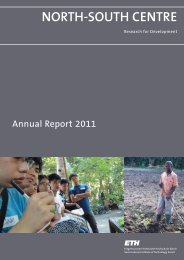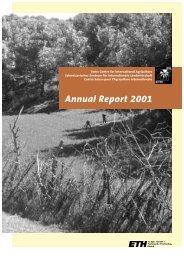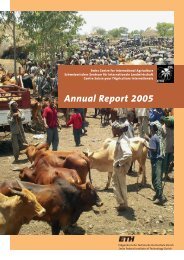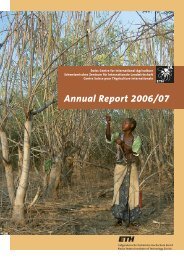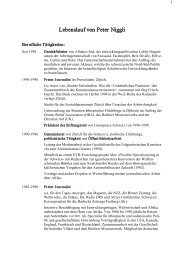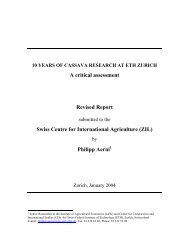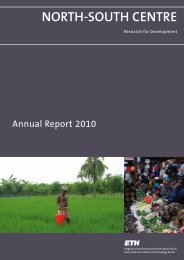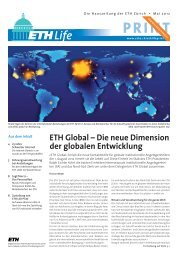NORTH-SOUTH CENTRE - ETH - North-South Centre North-South ...
NORTH-SOUTH CENTRE - ETH - North-South Centre North-South ...
NORTH-SOUTH CENTRE - ETH - North-South Centre North-South ...
You also want an ePaper? Increase the reach of your titles
YUMPU automatically turns print PDFs into web optimized ePapers that Google loves.
Assessing sustainable urban development<br />
in Asian megacities of developing countries<br />
Due to their size, complexity, growth rates and socio-cultural<br />
diversity, megacities in developing countries pose a particular<br />
challenge to the concept of Sustainable Urban Development<br />
(SUD). Over the last years, a number of indicator<br />
systems for the assessment of SUD have been developed.<br />
The systems combine indicators, such as per-capita income,<br />
literacy rate or particulate matter emission. These systems<br />
intend to cover the elementary needs for SUD in a designated<br />
city or city type and are thus helpful tools for understanding<br />
and communicating the context-specific issues of<br />
SUD. They further point out the need for improvement in<br />
areas with poor results, and contribute to the formulation<br />
of standards and development goals. Typically, indicator<br />
systems are embedded in comprehensive assessment programmes.<br />
However, most of these programmes remained<br />
at the study level or were in use for only a short period. Indepth<br />
analyses of existing practices in developing countries<br />
have rarely been conducted.<br />
The study draws on interviews with pivotal local actors in<br />
Jakarta (Indonesia), Bangkok (Thailand), Shanghai (China),<br />
Hyderabad and Ahmedabad (both India) conducted in 2008.<br />
Experts included (i) scholars, (ii) government officials at the<br />
national, provincial and municipal levels, (iii) representatives<br />
of regional planning authorities and urban planning<br />
associations, and (iv) representatives of social, environmental<br />
and international organisations. So far, the lessons<br />
learned – based on 16 indicator programmes – show that<br />
using indicators has positive effects, but may also harbour<br />
dangers. In developing countries, the experts focus more on<br />
the lack of effect and on negative contributions of sustainability<br />
indicators than previous literature has. In cities with<br />
numerous indicator systems in place, actors’ awareness<br />
of negative effects is higher. Constraints for the indicator<br />
implementation could be identified in six different areas,<br />
with a number of similarities between the five cities, but<br />
diverging key areas.<br />
Our project aims at understanding and developing assessment<br />
concepts for SUD in developing countries in Asia<br />
with a focus on megacities. We are exploring how pivotal<br />
actors perceive the contribution of sustainability indicators<br />
as their perception influences the implementation success.<br />
Specific implementation constraints, as well as success and<br />
failure factors of indicator systems are being identified, and<br />
models for the development of assessment programmes<br />
are being derived.<br />
Research fellow<br />
Sabrina Krank, <strong>ETH</strong> Zurich, Switzerland<br />
51<br />
Supervisors<br />
Holger Wallbaum, <strong>ETH</strong> Zurich, Switzerland;<br />
Adrienne Grêt-Regamey, <strong>ETH</strong> Zurich, Switzerland;<br />
Rashmi Mahon,<br />
Pragna Research and Consultancy Service, India<br />
Collaborators<br />
The research is conducted in cooperation with<br />
29 institutions in Jakarta, Bangkok,<br />
Shanghai, Hyderabad and Ahmedabad.<br />
Duration<br />
June 2007 – May 2010<br />
Research collaboration<br />
Urban and rural transformation<br />
Slum improvement project in Klong Bang Bua,<br />
Bangkok, Thailand: Canal bank with old structures (left),<br />
and redevelopment (right)




